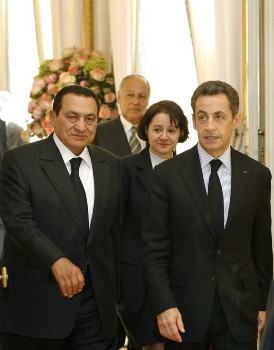Egypt cancels hosting of France-Africa summit over Bashir’s presence dispute
December 15, 2009 (PARIS) – The Egyptian government announced today that it has decided to cancel its hosting of the 25th France-Africa summit after failing to settle the dispute with Paris over the issue of inviting the Sudanese president Omer Hassan Al-Bashir who is wanted by the International Criminal Court (ICC) for alleged war crimes committed in Darfur.

Aboul-Gheit said that both sides agreed to move the summit venue to France which would effectively mean that Bashir will stay away for fear of being arrested on the territory of an ICC state party.
But other sources told the newspaper that Aboul-Gheit and his French counterpart Bernard Kouchner will meet later to agree on the “place and date” of the summit.
The participation of the Sudanese president in the summit has been subject of intense diplomatic wrangling between Cairo and Paris over the last few months. France dispatched its interior minister Brice Hortefeux last October to seek exclusion of Bashir from the summit.
European Union (EU) rules prohibit its members from engaging into contacts with an individual indicted by the ICC.
Last week, France’s Le Monde newspaper quoting officials at the Elysee palace said that Sarkozy is adamant about not inviting Bashir to the conference.
The officials speaking to the Le Monde said that “if Omar Al-Bashir is invited then Nicolas Sarkozy can not be present. Without his presence, there is no Africa-France summit”.
However, the newspaper said that Paris proposed a compromise in which the summit would be split in two parts, first at the ministerial level, focused on discussing economic issues with the absence of French officials, followed by a meeting of heads of state to which the Sudanese president would not be invited.
But Egypt has apparently rejected the proposal pushing the disagreement to the meeting between Sarkozy and Mubarak which took place in Paris today.
The list of events Bashir has skipped since the ICC warrant keeps growing. He has turned down several invitations in the last few months to attend events in Uganda, Nigeria, Venezuela, Denmark, Turkey, South Africa and US for fear of arrest.
This month the ICC prosecutor told the UN Security Council (UNSC) that Bashir cancelled appearances showed that he was facing increasing isolation and “sends a clear message [that] President al-Bashir will face justice”.
Richard Dicker, an international justice expert at the New York-based Human Rights Watch, agreed with the ICC prosecutor’s assessment, telling Reuters that “Bashir’s world is getting smaller and smaller”.
The decision by Cairo to forfeit the hosting of the summit is an extremely rare event in Egyptian diplomacy which is historically well known for its aggressiveness in seeking to assert its role as a respected regional power and the favorite spot for international conferences.
Egypt was one of the first countries to roll out the red carpet for Bashir following the issuance of the ICC arrest warrant in an act of solidarity with its southern neighbor.
However, the Egyptian move is likely not a carte blanche but rather driven by growing political and economic interests in Sudan.
Sudan has witnessed a huge influx of Egyptian labor in recent years needed to keep up with the booming economy thanks to a steady flow of oil revenues. The most populous Arab country is hugely dependent on remittances from Egyptians expatriates abroad as one of its hard currency sources.
Cairo is also relying on Khartoum’s backing in its confrontation with Nile basin countries which has stepped up their demands for amending the water sharing agreements signed in 1929 and 1959. Egypt is extremely sensitive to any talk about modifying its share in the Nile water with some officials saying that this amounts to a declaration of war warranting military action.
Yesterday the Egyptian irrigation minister Mohamed El-Din Allam said that both countries are “standing in the same front” in the negotiations with other Nile basin countries.
With almost 80 million people, Egypt’s water demands are projected to exceed its supply by 2017, according to a government reported published earlier this month.
Egyptian officials are also worried about the upcoming referendum in 2011 for Southern Sudanese as a vote for secession it might further impact its share in the Nile waters.
Another outstanding issue between the two countries is the dispute over the border area of Halayeb. Last October the Sudanese electoral commission announced that the residents of Halayeb will be allowed to register as voters in the elections but Cairo informally warned Khartoum to refrain from taking any actions in the area.
A few weeks later the Sudanese presidential adviser Mustafa Ismail visited Cairo and downplayed the dispute saying that the electoral commission did not consult with the government before making its decision.
Last week Egyptian authorities have reportedly barred the Sudanese presidential assistant Musa Mohamed Ahmed from entering the area.
(ST)
